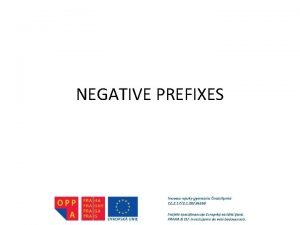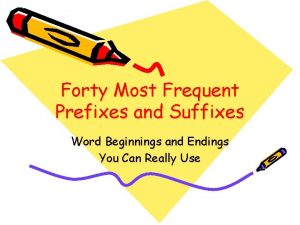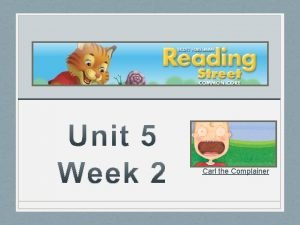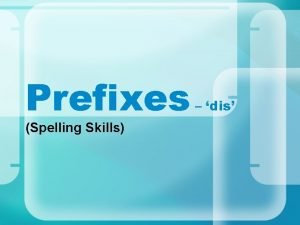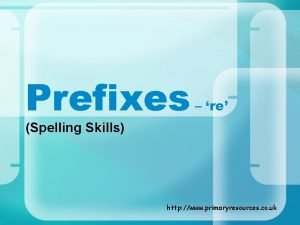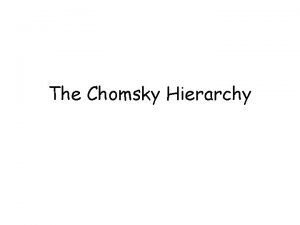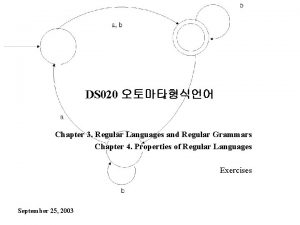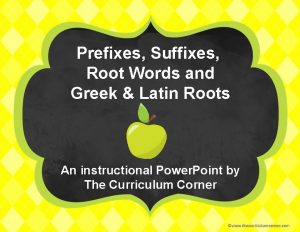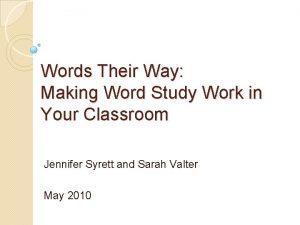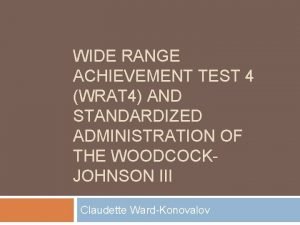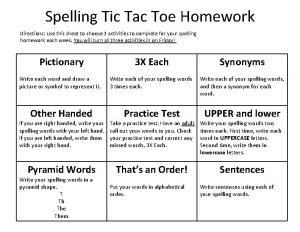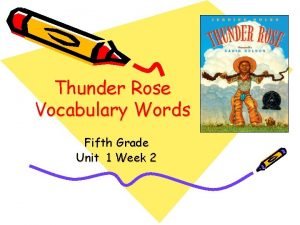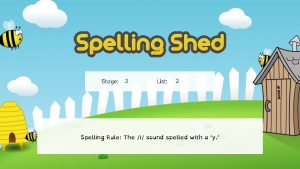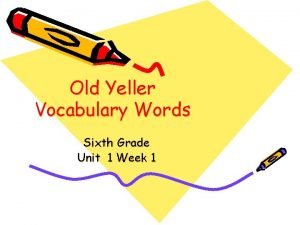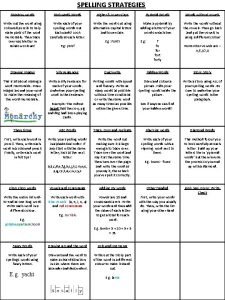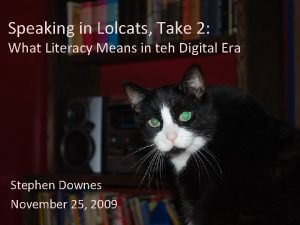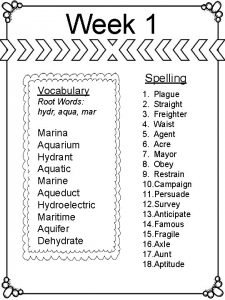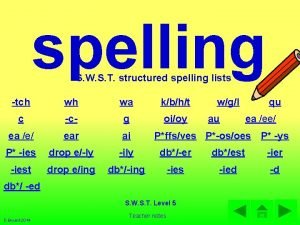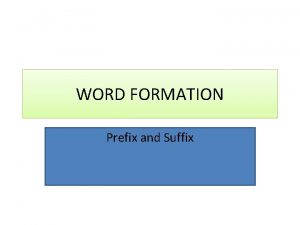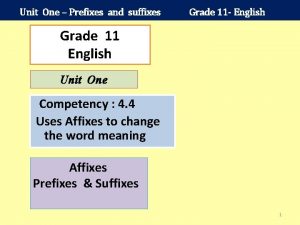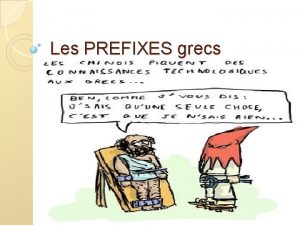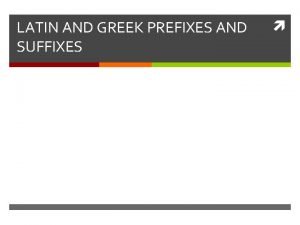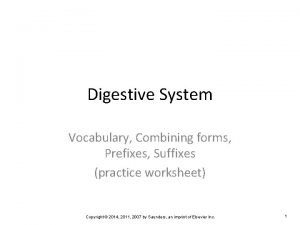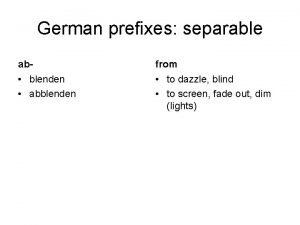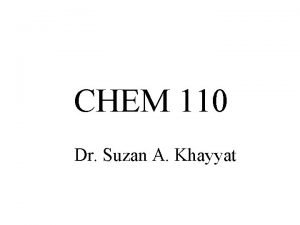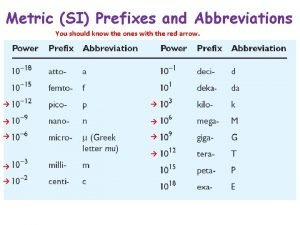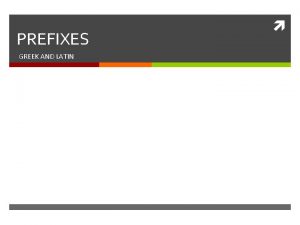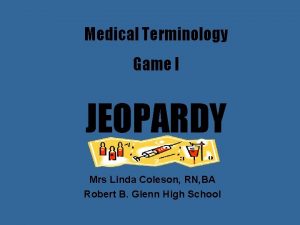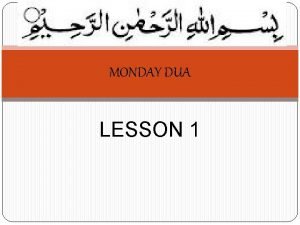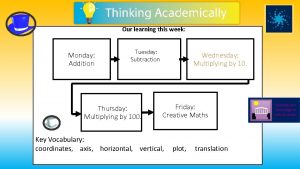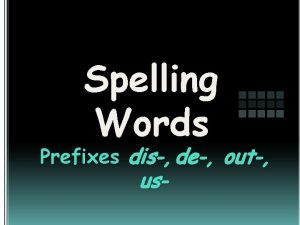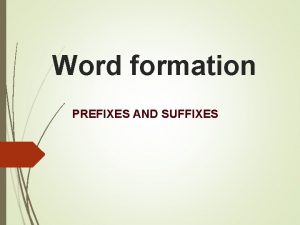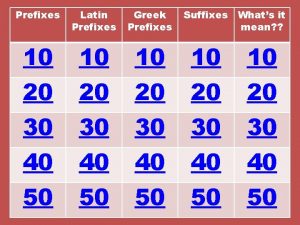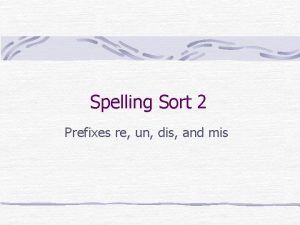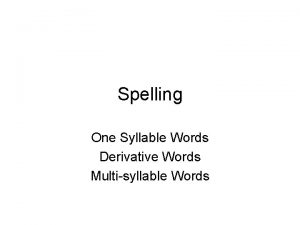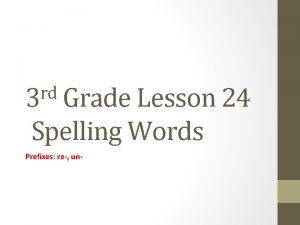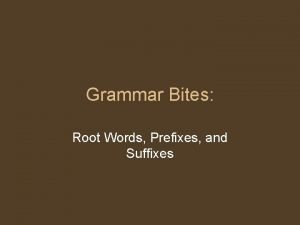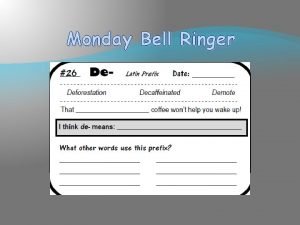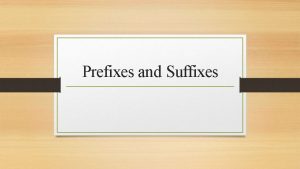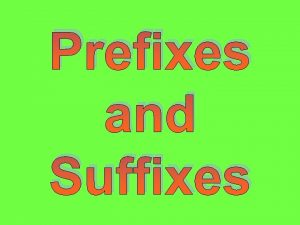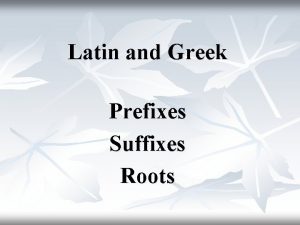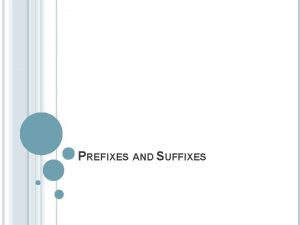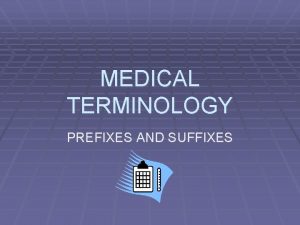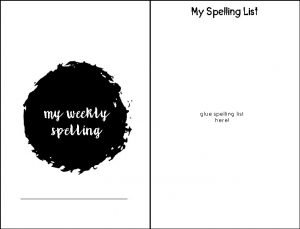Monday Spelling and Grammar Spelling Words Prefixes dis

















































- Slides: 49

Monday Spelling and Grammar

Spelling Words Prefixes dis-, de-, out-, us-

• discontent • decline • outward • dispatch • unwavering • destruction • disintegrate • outstanding • uncommon • outburst • outrageous • defensive • unappetizing • disillusioned • disarray • unconscious • outskirts • unfasten • disenchanted • decompose • unbusinesslike • disembark • deactivate • disenfranchise • outlandish • adolescence

Grammar Pronouns and Antecedents

she thought the pare was unapetizing She thought the pear was unappetizing. the zoo attendant’s welcomed all the chidren and his parents The zoo attendants welcomed all the children and their parents.

Pronouns and Antecedents People throughout the world know Jane Goodall and respect her. The pronoun her refers to the antecedent Jane Goodall. An antecedent is the noun to which a pronoun refers. A pronoun and its antecedent can appear in the same sentence or in separate sentences.

Pronouns and Antecedents A pronoun takes the place of a noun or nouns. An antecedent, or referent, is the noun or nouns to which the pronoun refers. A pronoun and its antecedent must agree in number and gender.

Pronouns and Antecedents Before you use a pronoun, ask yourself whether the antecedent is singular or plural. If the antecedent is singular, decide whether it is masculine, feminine, or neuter. Then choose a pronoun that agrees.

Pronouns and Antecedents In the following sentences, the antecedents are underlined once; the pronouns are underlined twice. Sal and Jo bought a book about chimps, and they read it together. Erik brought a camera to the zoo so he could take pictures.

Pronouns and Antecedents Underline the antecedent once and the pronoun twice. The chimpanzees gathered smooth sticks and used them to catch ants. Jane Goodall observed chimpanzees and helped them survive in nature.

Pronouns and Antecedents Underline the antecedent once and the pronoun twice. Chimpanzees have interesting ways of finding food when they are hungry.

Pronouns and Antecedents Underline the antecedent once and the pronoun twice. Although Vicky learned to say four words, very few people could understand her.

Pronouns and Antecedents Underline the antecedent once and the pronoun twice. We students are eager to meet Jane Goodall when she speaks at the school.

Pronouns and Antecedents Underline the antecedent once and the pronoun twice. Ai grabbed the doll and hugged it. In 1961, Ham was placed aboard a rocket to see whether he could survive the space flight.

Pronouns and Antecedents Choose the correct pronoun to complete each sentence. Underline the antecedent to which the pronoun refers. they it she us him Paige and I wanted to hold the baby chimp, but the mother would not let _____. Paige and I wanted to hold the baby chimp, but the mother would not let us.

Pronouns and Antecedents Choose the correct pronoun to complete each sentence. Underline the antecedent to which the pronoun refers. they it she us him Chimpanzees cannot speak because _____ have different vocal cords than ours. Chimpanzees cannot speak because they have different vocal cords than ours.

Pronouns and Antecedents Choose the correct pronoun to complete each sentence. Underline the antecedent to which the pronoun refers. they it she us him After Lucy grabbed a stone, ____ use it to crack open a nut. After Lucy grabbed a stone, she used it to crack open a nut.

Pronouns and Antecedents Choose the correct pronoun to complete each sentence. Underline the antecedent to which the pronoun refers. they it she us him The chimpanzee saw the banana and reached for ____. The chimpanzee saw the banana and reached for it.

Pronouns and Antecedents Choose the correct pronoun to complete each sentence. Underline the antecedent to which the pronoun refers. they it she us him Bill will take pictures if you give ____ film. Bill will take pictures if you give him film.

Spelling Words Prefixes dis-, de-, out-, us-

• discontent • decline • outward • dispatch • unwavering • destruction • disintegrate • outstanding • uncommon • outburst • outrageous • defensive • unappetizing • disillusioned • disarray • unconscious • outskirts • unfasten • disenchanted • decompose • unbusinesslike • disembark • deactivate • disenfranchise • outlandish • adolescence

Tuesday Spelling and Grammar

Grammar Pronouns and Antecedents

the monkeys was difensive about territory that they thought belonged to him The monkeys were defensive about territory that they thought belonged to them. dad drived aunt paula and i to the zoo Dad drove Aunt Paula and me to the zoo.

Pronouns and Antecedents A pronoun takes the place of a noun or nouns. An antecedent, or referent, is the noun or nouns to which the pronoun refers. A personal pronoun and its antecedent must agree in number and gender.

Spelling Words Prefixes dis-, de-, out-, us-

• discontent • decline • outward • dispatch • unwavering • destruction • disintegrate • outstanding • uncommon • outburst • outrageous • defensive • unappetizing • disillusioned • disarray • unconscious • outskirts • unfasten • disenchanted • decompose • unbusinesslike • disembark • deactivate • disenfranchise • outlandish • adolescence

Wednesday Spelling and Grammar

Grammar Pronouns and Antecedents

jane goodall have exhibited her unwaivering devotion to chimps Jane Goodall has exhibited her unwavering devotion to chimps. the apes outburst surprised she The ape’s outburst surprised her.

Pronouns and Antecedents A pronoun takes the place of a noun or nouns. An antecedent, or referent, is the noun or nouns to which the pronoun refers. A personal pronoun and its antecedent must agree in number and gender.

Pronouns and Antecedents If a pronoun’s antecedent is confusing, the sentence should be rewritten. Sometimes it is clearer to use a noun instead of a pronoun. Unclear: house. Clear: house. Pat and Kate went to her Pat and Kate went to Pat’s

Pronouns and Antecedents Review something you have written to check that pronouns have clear antecedents.

Spelling Words Prefixes dis-, de-, out-, us-

• discontent • decline • outward • dispatch • unwavering • destruction • disintegrate • outstanding • uncommon • outburst • outrageous • defensive • unappetizing • disillusioned • disarray • unconscious • outskirts • unfasten • disenchanted • decompose • unbusinesslike • disembark • deactivate • disenfranchise • outlandish • adolescence

Thursday Spelling and Grammar

Grammar Pronouns and Antecedents

doug and his classmates has finished her ape projects Doug and his classmates have finished their ape projects. do you agree that the logging companies is destroying the rain forest with their trucks Do you agree that the logging companies are destroying the rain forest with their trucks?

Pronouns and Antecedents A pronoun takes the place of a noun or nouns. An antecedent, or referent, is the noun or nouns to which the pronoun refers. A personal pronoun and its antecedent must agree in number and gender.

Pronouns and Antecedents Test Tip: When writing pronouns with appositives, try omitting the noun to see which pronoun form to use. Example: (We, Us) sixth graders use the computers daily. We use computers daily. We sixth graders use the computer daily. We is a subject pronoun for the sentence, We is the correct pronoun. Since

Spelling Words Prefixes dis-, de-, out-, us-

• discontent • decline • outward • dispatch • unwavering • destruction • disintegrate • outstanding • uncommon • outburst • outrageous • defensive • unappetizing • disillusioned • disarray • unconscious • outskirts • unfasten • disenchanted • decompose • unbusinesslike • disembark • deactivate • disenfranchise • outlandish • adolescence

Friday Spelling and Grammar

Grammar Pronouns and Antecedents

befour the chimps is fed they chatter in there cages Before the chimps are fed, they chatter in their cages. the crowd are listening to dr goodalls seminar The crowd is listening to Dr. Goodall’s seminar.

Pronouns and Antecedents A pronoun takes the place of a noun or nouns. An antecedent, or referent, is the noun or nouns to which the pronoun refers. A personal pronoun and its antecedent must agree in number and gender.

Spelling Words Prefixes dis-, de-, out-, us-

• discontent • decline • outward • dispatch • unwavering • destruction • disintegrate • outstanding • uncommon • outburst • outrageous • defensive • unappetizing • disillusioned • disarray • unconscious • outskirts • unfasten • disenchanted • decompose • unbusinesslike • disembark • deactivate • disenfranchise • outlandish • adolescence

We are now ready to take our test.
 Words prefix mis
Words prefix mis Cdsl tpin generation
Cdsl tpin generation Negative prefixes rules
Negative prefixes rules Most used prefixes
Most used prefixes Left and right linear grammar
Left and right linear grammar Lewis and clark and me vocabulary powerpoint
Lewis and clark and me vocabulary powerpoint Prefix un
Prefix un Dis means
Dis means Prefix re words
Prefix re words Weakness of traditional grammar
Weakness of traditional grammar Types of grammar
Types of grammar Right linear grammar to left linear grammar
Right linear grammar to left linear grammar Root word dyna
Root word dyna Words their way primary spelling inventory
Words their way primary spelling inventory Word study assessment
Word study assessment Wide range achievement test 5
Wide range achievement test 5 Exhibit past tense
Exhibit past tense 3rd grade spelling words
3rd grade spelling words Spanish spelling bee word list
Spanish spelling bee word list Outspoken in a sentence
Outspoken in a sentence Lullaby
Lullaby Stage 3 spelling words
Stage 3 spelling words Red kayak spelling words
Red kayak spelling words Old yeller vocabulary words
Old yeller vocabulary words Old yeller plot diagram
Old yeller plot diagram Thunder rose spelling words
Thunder rose spelling words Backwards spelling bee
Backwards spelling bee Spelling words
Spelling words Words with root aqua
Words with root aqua Soft c words
Soft c words Tricky words phase 3
Tricky words phase 3 Spelling lesson 2: content words
Spelling lesson 2: content words Word formation prefixes and suffixes
Word formation prefixes and suffixes Below age prefix
Below age prefix Roots examples
Roots examples Prefixes grecs
Prefixes grecs Outcome synonm
Outcome synonm Prefix for digestion
Prefix for digestion Suffixs
Suffixs German prefixes and suffixes
German prefixes and suffixes The si prefixes kilo and milli represent respectively
The si prefixes kilo and milli represent respectively Word drill roots 1
Word drill roots 1 Knowledge prefix or suffix
Knowledge prefix or suffix Prefix of metric system
Prefix of metric system Greek prefixes
Greek prefixes Jeopardy terminology
Jeopardy terminology Veterinarian pronounciation
Veterinarian pronounciation On monday i have math and art
On monday i have math and art Dua for monday
Dua for monday On monday and tuesday
On monday and tuesday


